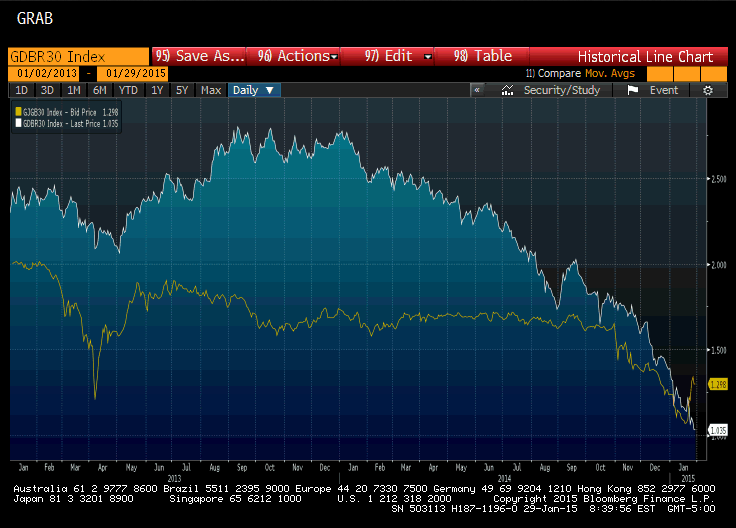There are a number of investors and economists who argue that, yield wise, where Japan was, Europe and the US are headed. Most recently they emphasize Europe following Japan more than the US.
Although we recognize some similarities, we suspect they are superficial in nature. For example, the deflation that has gripped Japan is qualitatively different than the deflation being recorded in the euro area. The deflation in the eurozone is primarily a function of the drop in oil prices. Core inflation, as we will see with Friday's preliminary release, remains positive.
Both the eurozone and Japan have bank-centric models of capital distribution, in contrast to the US, for example, which relies on the markets more than banks. We recognize that the banking crisis hit hard and lingered for years. However, there is great divergence between the health of eurozone banks, especially along regional lines.
In addition, the role of German in the monetary union knows no parallel with Japan. The role of bunds is different than that of JGBs. The ownership of JGBs is largely domestic. They are hardly used as reserve assets. The German bund is a different animal. It is owned widely and used as a reserve asset.
This Great Graphic, created on Bloomberg shows the yield of the (generic) German 10-Year bund (white line) and the 30-year JGB (yellow line). The 30-Year bund yield has fallen below the 30-year JGB yield. Not shown on this chart, but the JGB 30-year yield did, according to Bloomberg data, fall to a 91 bp in 2003. The low since the BOJ's QE was announced earlier this month was near 1.07%. Today the German bund yield fell below 1.03%. Further declines are likely.

There are three considerations. First, the German preliminary January CPI fell to -0.3% from +0.2%in December. This was a greater decline than the consensus expected. As we noted earlier, the Bundesbank is opposed to the ECB's bond buying. But besides saying "nein" and expressing concern about moral hazard, they have not offered alternative proposals to achieve their legal mandate -- price stability. The legal requirement to achieve price stability has been emphasized by ECB President Draghi. The logical conclusion of some of the comments from BBK head Weidmann is to focus on core inflation. But as much as we have argued for this, it has not been picked up by others.
Second, the ECB's sovereign bond-buying program requires the purchase of about 100 bln euros of German bunds. There is already a shortage of the AAA asset. In addition, new supply will be limited as the German coalition government (CDU/SPD) projects a balanced budget this year. Moreover, the debt office plans on paying down some of Germany's debt, which means overall supply will shrink.
Third, doubts about the sustainability of monetary union have resurfaced. Many euro skeptics were silenced by the ECB's pledge to "do whatever it takes" to defend monetary union. However, in light of the Greek election, all the old arguments have returned. Monetary union before political union has never worked. The tax payers of the creditor nations have been bled dry and have little appetite to give more. Although we have problems with these assertions, the point here is that they have resurfaced. The last time the 30-year bund yield fell below the similar JGB yield came as the last phase of the euro zone crisis peaked around the middle of 2012 -- before Draghi's pledge. In that light, the German bund has an embedded call option on a new German mark, which can be expected from a strong currency if the EMU were to end.
